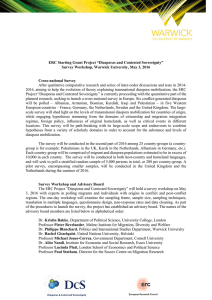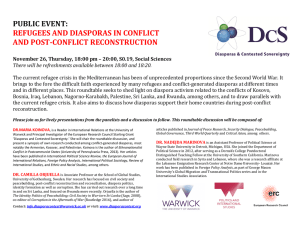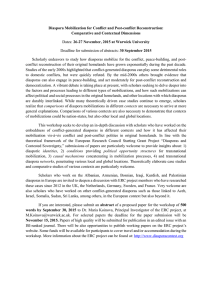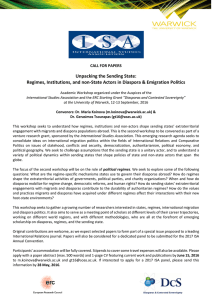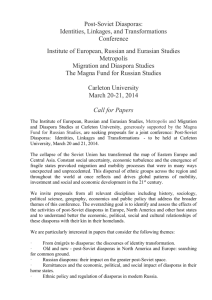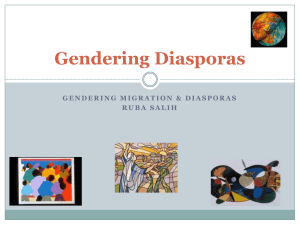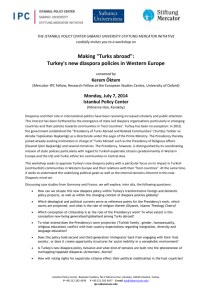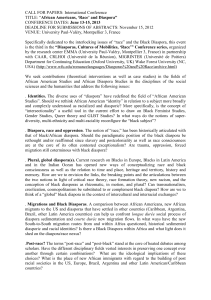Koinova, Maria (2010) Diasporas and international politics : utilizing the... creed of liberalism for particularistic and nationalist purposes. In: Bauböck,... Original citation:
advertisement
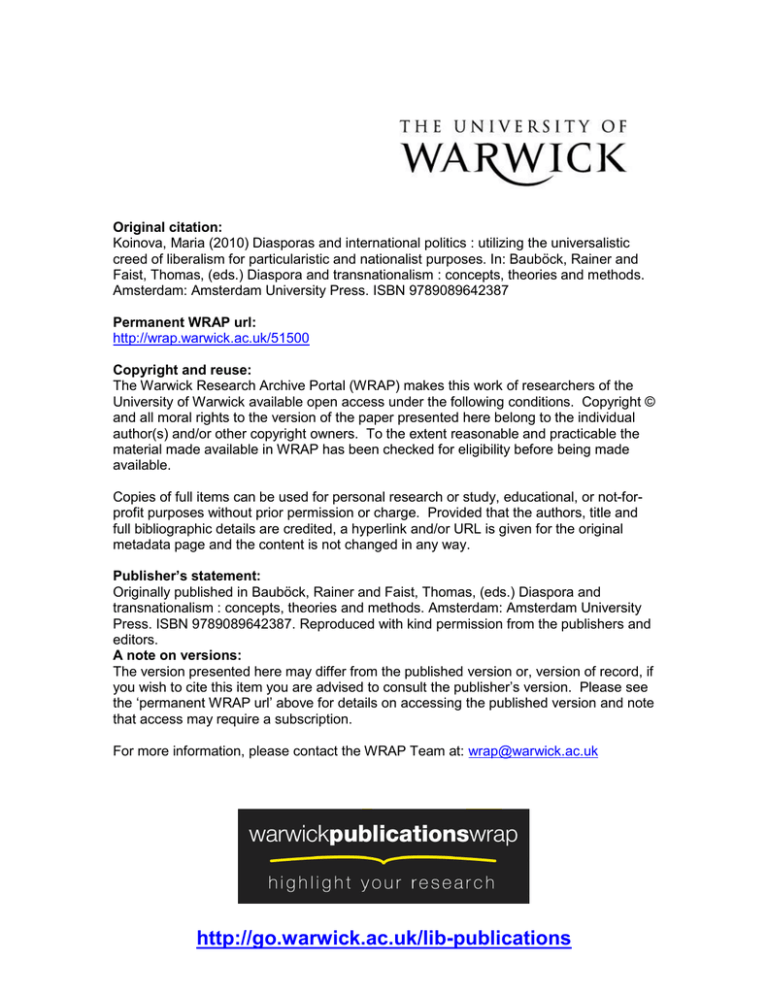
Original citation: Koinova, Maria (2010) Diasporas and international politics : utilizing the universalistic creed of liberalism for particularistic and nationalist purposes. In: Bauböck, Rainer and Faist, Thomas, (eds.) Diaspora and transnationalism : concepts, theories and methods. Amsterdam: Amsterdam University Press. ISBN 9789089642387 Permanent WRAP url: http://wrap.warwick.ac.uk/51500 Copyright and reuse: The Warwick Research Archive Portal (WRAP) makes this work of researchers of the University of Warwick available open access under the following conditions. Copyright © and all moral rights to the version of the paper presented here belong to the individual author(s) and/or other copyright owners. To the extent reasonable and practicable the material made available in WRAP has been checked for eligibility before being made available. Copies of full items can be used for personal research or study, educational, or not-forprofit purposes without prior permission or charge. Provided that the authors, title and full bibliographic details are credited, a hyperlink and/or URL is given for the original metadata page and the content is not changed in any way. Publisher’s statement: Originally published in Bauböck, Rainer and Faist, Thomas, (eds.) Diaspora and transnationalism : concepts, theories and methods. Amsterdam: Amsterdam University Press. ISBN 9789089642387. Reproduced with kind permission from the publishers and editors. A note on versions: The version presented here may differ from the published version or, version of record, if you wish to cite this item you are advised to consult the publisher’s version. Please see the ‘permanent WRAP url’ above for details on accessing the published version and note that access may require a subscription. For more information, please contact the WRAP Team at: wrap@warwick.ac.uk http://go.warwick.ac.uk/lib-publications Suggested Citation: Maria Koinova, 2010. "Diasporas and International Politics: Utilizing the Universalistic Creed of Liberalism for Particularistic and Nationalist Purposes," Chapter 8 in Rainer Bauboeck and Thomas Faist (eds.) Diasporas and Transnationalism. Concepts, Theories, and Methods (Amsterdam: Amsterdam University Press). 1 Introduction The growing pace of globalisation in the first decade of the twenty-first century has prompted scholars to gain a better understanding of the role of non-state actors in world politics. Transnational social movements challenge states on international issues such as global warming and inequalities. International NGOs criticise states for disrespecting human rights and lagging on democratisation and development. Terrorist groups use violence to advance transnational ideological and religious creeds that transcend the state. Diasporas use institutions of their host state to advocate causes for their home states. All these non-state actors are relatively autonomous from the state they live in and its material resources; they are transnational or linked to more than one state, and they seek to affect political change. Analysing diasporas as non-state actors is a relatively new trend in political science. While diaspora studies first emerged from cultural studies, anthropology and sociology, political science followed this trend starting in the 1990s. (Sheffer 2003, Shain 1994-95, 2002, 2007, King & Melvin 1999/2000, Byman 2001, Kaldor 2001, Wayland 2004, Adamson 2005a, 2006, Brinkerhoff 2006, Lyons 2006, Ostergaard-Nielsen 2006, Smith & Stares 2007). Interest in diasporas grew after 11 September 2001 because foreign-born nationals living in Western states were behind the terrorist attacks. There is a growing understanding that during this era of globalisation, diasporas are not simply migrants to host states, they are linked simultaneously to many political contexts through cheap communication and transportation networks. Diasporas are becoming political actors with local and transnational agendas. To theorise about diasporas in political science means facing a number of challenges, including the conceptual ambiguities surrounding the term ‘diaspora’. As highlighted in more detail elsewhere in this volume, positivist conceptualisations have so far dominated the field, viewing diasporas as multigenerational groups of migrants who share a similar identity and maintain recurrent contacts with their country of origin (Esman 1986, Safran 1991, Sheffer 1993, Cohen 1997, Bruneau this volume). Alternative constructivist accounts have recently become more widespread. They treat diaspora as ‘a category of practice, project, claim and 1 stance, rather than as a bounded group’ (Brubaker, 2005). Nevertheless, conceptualising diasporas as a global political phenomenon requires more than mirroring classic disagreements in the literature on how to define the ‘nation’ (Gellner 1983, Hobsbawm 1990, Anderson 1991, Smith 2001). Diasporas in the global age differ from nations of the modern age because they have multiple national identities and loyalties and are interlinked across the globe. The original nation is no longer ‘homogeneous.’ Dual citizenship and multiple loyalties abound but are not yet conceptually integrated into the term ‘diaspora’. These conceptual deficiencies obscure the unit of analysis in political science. The questions asked, methodologies used, and generalisations reached are affected by whether a scholar considers a diaspora to be a bounded group, a conglomerate of elites and individuals functioning within that bounded group, networks or enduring discursive patterns. Positivist views facilitate asking questions about the impact of diasporas on the state and political processes within it, the use of comparative and statistical methods and conceiving of diasporas as unitary actors or elites with a shared identity. Such research designs simplify the complexity of a diaspora by ignoring generational, gender and location-based differences, but examine correlations and causality between dependent and independent variables. In contrast, a constructivist view of diaspora enables more complexity and asks questions about how diasporas emerge, who belongs to them from various generations and genders, and how identities in general (rather than a specific group or elites) affect the political world or are affected by it. This line of scholarship is closer to the humanities, where content and discourse analyses are often the methods preferred. Without trying to resolve the conceptual debate about the term ‘diaspora’, I adopt in this chapter a definition used by Adamson and Demetriou to address the contours of a ‘diaspora’ in the global space, which contains both positivist and constructivist elements: ‘A diaspora can be identified as a social collectivity that exists across state borders and that has succeeded over time to 1) sustain a collective national, cultural or religious identity through a sense of internal cohesion and sustained ties with a real or imagined homeland and 2) display an ability to address the collective interests of members of the social collectivity through a developed internal organizational framework and transnational links’ (2007: 497). The second major problem with theorising diasporas in political science stems from the non-consensual definition of the term ‘non-state actor’. While I have outlined above three major traits of non-state actors – autonomy from the state, transnationalism and aspirations for political change – legitimate questions arise about all of them. How autonomous is a non-state actor if state programs are often the sponsors of NGOs, transnational social movements are 2 penetrated by state officials and terrorist groups – such as Hezbollah and Hamas – and are embedded within state institutions? How transnational are non-state actors? Are they ‘rooted cosmopolitans’ (Tarrow 2005) embedded primarily in one political context while maintaining links with others across the globe or are they embedded simultaneously in several social and political contexts (Portes 1999)? Finally, some non-state actors, such as international NGOs, may have a clearly defined agenda for political change. Diasporas have no clearly unified agendas. Their institutions, powerful individuals and transnational networks are capable of steering political change, but often advance competing claims. Thus, political science scholarship on diasporas has much conceptual and theoretical work ahead. This chapter will focus on theorising the role of diasporas in world politics, but will concentrate specifically on diasporas in liberal democracies linked to homelands experiencing limited sovereignty.1 Since the end of the Cold War and the growing pace of globalisation, territories of limited sovereignty have proliferated due to secessionist and other intra-state conflicts. Their ambiguous international status opens considerable political opportunity for international actors to intervene to shape domestic developments. Diasporas are among these actors because of their connection to their kin in the homeland and their significant resources which local elites are eager to capture. In this chapter I argue that such diasporas utilise democratic discourses and procedures in order to pursue nationalist projects related to their land of origin. The mechanisms used relate to how diasporas filter global pressures for democratisation. 2 Theoretical accounts of diasporas as radical and moderate actors Recent scholarship on diasporas and homeland politics has focused on the role of diasporas in conflicts and post-conflict reconstruction in their homelands. This interest has been prompted by two major findings. In 2000 a statistical large-N study on the economy of civil war demonstrated that civil wars that have strong diaspora involvement are highly likely to continue to perpetuate, especially if the diaspora has large concentrations in the US (Collier & Hoeffler 2000). Kaldor arrived at the same conclusion from a different theoretical perspective; juxtaposing ‘new’ (intrastate) vs. ‘old’ (interstate) wars, she found that diasporas were crucial in sustaining the intrastate wars of disintegration of former Yugoslavia during the 1990s (2001). In the early 2000s other studies made similar generalisations, mostly deriving internal 1 International legal sovereignty designates the judicial recognition of an international legal entity. Domestic sovereignty denotes the ability of domestic authority structures to control activities within their territorial borders (Krasner 2001). 3 validity from case studies rather than external validity across many cases. The Tamil Tigers and the conflicts in Sri Lanka, the Albanians and the conflict in Kosovo in the 1990s, the Kurds and the conflicts in southern Turkey and Iraq and others have occupied scholarly attention. As a result, diasporas have largely been considered ‘long-distance nationalists’ (Anderson 1998), that participate in a wide range of nationalist and conflict-perpetuating activities because they lead comfortable lives in the industrialised world and do not face the consequences of their actions. Diasporas that emerged as a result of political conflicts rather than from economic or other types of voluntary migration maintain traumatic identities attached to homeland territory and the myth of return that bar them from seeing potential avenues for conflict resolution (Faist 2000, Shain 2002, Scheffer 2003, Lyons 2006, Smith & Stares 2007, Baser and Swain 2008). While they lobby their homeland governments, organise peaceful demonstrations and provide humanitarian aid, they often mobilise for radical causes in the transnational space. They broadcast hate speech and nationally intolerant messages, engage in fundraising and sponsorship for radical groups and often take up arms and go to fight in the homeland (Byman 2001, Hockenos 2003, Biswas 2004, Wayland 2004, Adamson 2005, Fair 2005, Lyons 2006, Orjuela 2008). More recently, other scholars have noted that such accounts are one-sided and do not capture the peaceful practices in which a number of conflict-generated diasporas have been engaged. While the Boston-based Irish diaspora for years helped perpetuate the conflict in Northern Ireland by supporting the Irish Republican Army through fundraising activities, it was able to moderate its stances after intervention from the Clinton Administration in the peace process that led to the 1998 Good Friday Agreement (Cohrane 2007, Anonymous 1, 2008). More recently, the Ethiopian and Kurdish diasporas have been promoting moderate politics in their homelands ravaged by internal wars (Lyons 2006, Koser 2007, Natali 2007, Zunzer 2008). Diasporas have been able to promote liberal ideals and participate in the democratisation of their home countries before the end of communism and thereafter (Shain 1999, Biswas 2007, Koinova 2009). Nevertheless, scholarship is still in the preliminary stages of understanding the conditions and mechanisms that make diasporas agents of radicalisation or moderation of politics in their homelands. Little comparative work exists, and much scholarship describes diaspora practices in different cases instead of building theory. In this chapter I go beyond taking sides in a cluster of arguments maintaining that diasporas are either ‘nationalists who perpetuate conflicts’ or ‘could be moderate actors’. I argue that diasporas in liberal societies linked to homelands experiencing challenges to their external or internal sovereignty react to 4 these challenges not simply by endorsing nationalist rhetoric and activities. Rather, they act in a more sophisticated way, filtering international pressures for democratisation in a world where the liberal creed has no significant ideological opponent after the end of the Cold War apart from radical Islam, which nevertheless has incoherent ideological messages across a variety of internally divided communities and organisations. Hence, diasporas use the universalist creed of liberalism instrumentally in order to increase their political clout with Western governments while simultaneously pursuing nationalist projects related to their country of origin. They do so by: (1) using discourses about democratisation, peace and reconciliation and (2) occasionally endorsing minimal democratic procedures. They do not, however, promote a full-fledged version of liberalism and they fall short of supporting liberal democratic values. I build this argument on the basis of numerous interviews which I conducted with representatives of the Albanian, Armenian, Ukrainian, Serbian and Lebanese diasporas in Washington DC and other locations in the East Coast of the United States, Kosovo and Lebanon between 1999 and 2008.2 In this chapter I expand this argument based on literature and interviews conducted among diaspora returnees in Macedonia in the summer of 2008. While I am aware that these diasporas do not represent the entire universe of cases, they are nevertheless representative of diasporas generated by conflicts and severe tensions in deeply divided societies. I limit the scope of this study to diaspora linkages with homelands that do not experience acute violence. Non-violent periods allow domestic and external actors – including diasporas – to make choices ranging from moderate to radical in order to affect domestic change. The gamut of choices is foreclosed during periods of violent warfare in the homeland when diasporas almost unconditionally support the local actors who best advance nationalist goals (Shain 2002). Under violent conditions, radicals usually hold more political clout. In order to avoid simplifications when generalising about diaspora behaviour, scholars should examine diaspora mobilisation and attitudes during different stages of the political processes in the homeland. On the most basic level, a diaspora could become belligerent when violence affects its ethnic brethren, but become much more constructive when the violence stops. Bercovich rightly argued that a diaspora’s involvement may vary depending on the conflict-cycle in the homeland (2007: 27). However, his account considers cycles of violence from a beginning to an end, and ignores the fact that in states where sovereignty is deeply 2 In-depth comparative studies on concrete conflicts can be found in Koinova (2009, forthcoming). 5 contested – e.g. Lebanon, Kosovo or Nagorno-Karabakh – conflicts may last for decades in some parts of the country while non-violent relationships predominate in others. Thus, a diaspora connection to the homeland may not be related to a conflict cycle per se but to the violence and non-violence ensuing during larger processes of secessionism, state collapse and contested sovereignty. The Albanian diaspora provides a good example. It supported the radical Kosovo Liberation Army (KLA) during the most violent years of Kosovo’s secessionist struggle, 1998-1999. The Albanian diaspora acted more moderately, however, prior to the conflict and following NATO’s 1999 military intervention in Serbia. This moderation occurred despite the fact that Kosovo did not enjoy international state sovereignty throughout that time and gained independence only in February 2008. 3 Diasporas and the liberal creed Socialised with liberal values in Western societies, diasporas could be expected to be interested in promoting them in their homelands. Indeed, this often occurs in the transnational space. Diasporas teach their extended families and friends about democratic practices, such as how to vote and elect local government, and develop gender equality norms, a process termed a transfer of ‘social remittances’ (Levitt 2001). Moreover, there are deep-seated reasons motivating this transfer. Voluntary migrants chose a democratic political system over living in their original societies, whether autocratic, semi-autocratic or democratic. At first glance, conflict-generated diasporas may look different from voluntary migrations because they were dispersed by violence and could not pro-actively make political choices. However, this perception is not entirely accurate. Political exiles – such as many among the Lebanese and Albanians from this pool of cases – were given asylum because of their pro-democracy inclinations. Even refugees dispersed by violent conflicts and settled in Western states – such as the refugees from the wars of disintegration of former Yugoslavia – have interacted with the political culture of their host country for extended periods of time and internalised some of the liberal political values. Moreover, political pluralism allowed many migrants who did not have a political voice in their homeland to form political groups and societies in their host lands (Adamson 2002). These formations socialised migrants with the democratic values of freedom of speech and association. Empirically, however, we can still observe a wide range of diasporic practices: radical activities, aggressive and passive nationalism as well as interest in promoting democratisation. The Polish diaspora, for example, was consistently anti-communist and prodemocratic long before the end of communism. Thus, it would not be an analytically crucial 6 case for elucidating reasons why and ways in which diasporas might relate to democratisation during the age of globalisation. Diasporas linked to homelands experiencing internal or external challenges to their sovereignty would be more analytically significant because these challenges make them more prone to act on the nationalist and radical side of the spectrum. If they were to act with moderation, however, there should be clear-cut reasons explaining this behaviour. Challenges to the homeland’s sovereignty put diasporas’ engagement with the liberal creed to what social sciences call ‘strong tests’.3 I argue that the diasporas of this kind utilise the universal creed of liberalism for particularistic purposes. They are neither simply nationalists nor simply democracy promoters. They claim a middle ground by adopting democratic discourses and using democratic procedures to advance nationalist goals. Situating their claims in this central space, they use the existing global opportunity structure of liberalism to advance goals related to their country of origin. Teleological statements that democracy signals ‘the end of history’ and an end-point of man’s ideological evolution after the end of communism (Fukujama 1992) would be misplaced in this discussion. Nevertheless, acknowledging that liberal democracy has been the most powerful ideological creed for the past two decades would be an accurate description of its place in the global normative space. Adamson even argued that liberalism has become a global opportunity structure in the international system (2005: 547569). However discredited by the US-led preemptive wars in Afghanistan and Iraq of the early 2000s justified in the name of ‘democracy’, democracy promotion has nevertheless long been embedded in the foreign policies of major powers such as the United States and the European Union, and in global institutions linking democracy promotion with development aid, such as the World Bank and the International Monetary Fund. Thus, almost every country in the world – even if not sincerely interested in promoting democratisation within its borders – has been exposed directly or indirectly to elements of the liberal creed. One could rightly argue that Marxism lost its currency as an ideology with the demise of communism, but economic inequalities within societies and across the North-South divide are growing and creating space for new ideological creeds to emerge and channel such grievances. The anti-globalisation social movements that grew in ascendance in the 1990s have been one venue to address them, but they lacked a clear ideology and have lost some significance (Tarrow & Hadden 2007). Thus, the majority of grievances have been channelled through religious-based movements making claims on behalf of populations of various 3 A ‘strong test’ is one whose outcome is unlikely to result from any other factor except the operation or failure of the proposed theory (Van Evera 1997). 7 nationalities living in multiple states. Islam in particular has aspired to such a global ideological reach (Adamson 2005). While ambitions for a global Islam certainly exist, the actual reach of Islamic organisations has been confined to certain world regions such as the Middle East, Caucasus and Central and Southeast Asia. Islamic groups are stronger in Europe than in the United States and Australia and have no real footing in Latin America. 4 Democratic discourses for particularistic purposes One way in which diasporas linked to homelands experiencing challenges to their sovereignty engage with the political projects in their country of origin is to frame sovereignty within discourses on democratisation. In order to demonstrate how they do so, I use theoretical insights from the literature on framing, an integral part of scholarship on social movements. Works on transnational social movements – addressing anti-globalisation, environmental, feminist and other movements – originally engaged with theorising on principled action based on universalist claims rather than on particularistic projects of identity-based actors such as diasporas (Keck & Sikkink 1998, Risse 1999, Della Porta & Tarrow, 2005, Tarrow 2005). However, a number of scholars have incorporated ideas from this scholarship into their works seeking to capture dynamics in diaspora politics. Most notably, the opening of political opportunity structures such as the onset of wars, withdrawal of foreign troops and the political opportunities available in the ‘host country’ and the international environment have been deemed important to the political mobilisation of diasporas (Wayland 2004, Adamson 2005, Brinkerhoff 2006, Smith & Stares 2007, Natali 2007, Skrbic 2007, Koinova 2009). Political opportunities both constrain and enable diasporas and determine to a certain extent their ideological and strategic choices (Biswas 2004). The choice to frame pro-sovereignty claims in democratisation terms deserves attention as an important characteristic of diaspora mobilisation. A frame is an ‘interpretative schemata that simplifies and condenses the “world out there” by selectively punctuating and encoding objects, situations, events, experiences, and sequences of actions within one’s present or past environment’ (Snow & Benford 1992). Effective frames demonstrate that the existing status quo is not natural, identify a responsible party or parties and propose credible solutions (Keck & Sikkink 1998). Framing takes place alongside strategic ‘alignment processes’, among which ‘frame bridging’ is the most common (Benford & Snow 2000). Frames do not operate in a vacuum but are dynamically related to political and cultural opportunities and constraints. In the transnational realm, local insurgents capture distant imaginations and the support of international actors by successfully matching 8 five shared elements with their international counterparts: substantive goals, customary tactics, ethical precepts, cultural attitudes, and organisational needs (Bob 2005). I will illustrate how framing of sovereignty is linked to democratisation by comparing the case of the Lebanese diaspora linked to the movement in Lebanon between 2000 and 2005, and the Albanian diaspora linked to the pro-sovereignty movement in Kosovo between 1999 and 2008.4 The largely non-violent episode of contested sovereignty in Lebanon began in 2000 when Israel withdrew its military forces from the country’s south and finished with Syrian troops’ withdrawal in 2005. The Lebanese diaspora linked to Lebanon mobilised to restore the country’s internal sovereignty and the ability of domestic institutions to function without perpetual interference from Syria. In Kosovo, the period started with the end of NATO’s military intervention in 1999 and the arrival of the United Nations Administration in Kosovo (UNMIK) on Kosovo’s territory, and to a certain degree ended with the proclamation of Kosovo’s independence in February 2008.5 The Albanian diaspora was strongly connected to the pro-sovereignty efforts of local elites and institutions that chose an ‘institutional path to independence’ over previous strategies of non-violence and guerrilla warfare. The Lebanese and Albanian diasporas used the process of frame bridging to connect sovereignty with democratisation claims. The process refers to the ‘linking of two or more ideologically congruent but structurally unconnected frames regarding a particular issue or problem’ (Benford & Snow 2000). Sovereignty and democracy are ideologically congruent because national self-determination has been a major part of the democratic creed since US President Woodrow Wilson formulated his fourteen points at the end of World War I. In both cases diasporas linked sovereignty and democracy, aspiring to resonate with US policy with respect to the global promotion of democracy. While often contesting each other and acting without sustained coordination, Lebanese diaspora organisations nevertheless adopted a similar pro-democracy stance: ‘Help Lebanon to regain its place among democracies of the world…’ appealed Hassan El-Najjar, a prominent diaspora individual, to US President George W. Bush (Najjar 2001). Delegates of the World Maronite Congress, a pro-opposition and anti-Syrian gathering of journalists, exiles and Lebanese-diaspora members in Los Angeles in 2002, joined forces to ‘speak with a common voice and to advocate a Free and 4 For a further in-depth discussion about framing, access, and shifts of foreign policy with regard to these cases see: Koinova, Review of International Studies, forthcoming 2011.. 5 One can rightly argue that challenges to Kosovo’s sovereignty have not been completely resolved with the February 2008 declaration of independence, since as of July 2009 Kosovo had been recognised by only 62 of the 192 UN member states. Nevertheless, this major event paved the way for UN rule in Kosovo to be significantly downsized, and for statehood structures to develop further, including the development of diplomatic missions in major countries that have recognised Kosovo. Most notably, it created widespread sentiment among the Kosovars that their sovereignty goal has been finally achieved. 9 Sovereign Lebanon…free to elect a democratic government where all are equal…’ (LFP 2002). Supporters of one of the most active diaspora factions, the Free Patriotic Movement (FPM) of Michel Aoun, exiled in France, used its political influence in the US to emphasise Lebanon’s partnership with the US in building democracy in the Middle East (Anonymous 2, 2007). Individuals linked to the Lebanese Forces, another political group with strong diaspora presence, linked sovereignty and democracy claims by emphasising that human rights abuses should not be tolerated in Lebanon. They argued that they occur because Syria suppresses the domestic opposition (Anonymous 3, 2007). These claims were made keeping in mind that their leader, Samir Geagea, was imprisoned in Lebanon. Like their Lebanese counterparts, Albanian diaspora organisations in the US held personal and institutional rivalries but they also adopted a clear stance linking Kosovo’s international sovereignty to a democratic discourse. Joe DioGuardi, president of one of the most influential diaspora institutions, the Albanian American Civic League (AACL), congratulated Kosovo Albanians for their ‘disciplined behavior’ in the 2000 municipal elections and claimed that it established that ‘Kosova is ready for a democratic society and self-governance’. Although he maintained ties with less moderate parties in Kosovo that emerged out of the former KLA, including war veterans, he nevertheless claimed that he wanted to ‘see leaders who are ready to demonstrate that Albanians are ready to solve problems…’ thus ‘speeding Kosovo’s democratization and solidifying international support for its independence’ (Zeri 2000). The National Albanian American Council, a Washington DC-based organisation more closely related to parties in Kosovo, which had emerged from the non-violent Democratic League of Kosovo during the 1990s, emphasised the need to develop the rule of law, and launched programs for the democratic education of Kosovars to pave the way to independence (Anonymous 4, 2006). Although diaspora groups shared a rejection of the UN policy ‘standards before status,’ developed in 2002 to give leverage to the international community in speeding the democratisation process and including respect for minority rights, they used the democratic creed to justify their own logic against this policy. They argued that regardless of intentions, ‘standards before status’ de facto prevented Kosovo from becoming more democratic. Self-government without membership in international institutions that open opportunities for economic development is difficult to sustain. One could argue that democratic discourses can be adopted easily because there is no cost to advancing them and commitments are not ‘sticky’. While such observations sound almost commonsensical, the literature on democratisation of Eastern Europe of the 1990s has shown that rhetorical entrapment could be a mechanism for further democratic change 10 (Schimmelfenning 2001). Reputational rather than material costs are paid if one deviates greatly from rhetorical commitments. Especially in Western societies, reputational costs matter. Diasporas who often want to be viewed as ‘good citizens’ (Biswas 2007), also want to avoid increased securitisation measures after the terrorist attacks of 11 September 2001 (Rudolph 2003) and various stigmas related to their connection to a conflict-ridden homeland. They could face reputational costs if they do not adhere to their discursive arguments. 5 Democratic procedures and unresolved nationalist goals Diasporas not only use democratisation discourses, they also promote minimal democratic procedures in their homeland. These practices are mostly related to electoral pluralism and rotation of power of local elites rather than to liberal aspects of democratisation associated with human, minority or gender rights. Diasporas advocate these democratic procedures for nationalist and other particularistic purposes. Evidence from diasporas linked to the democratising region of Eastern Europe during the past two decades could well elucidate this point. Serbia was a chronically disintegrating state from 1991 and did not enjoy full internal sovereignty over Kosovo during the 1990s. Local political institutions, economic life, educational and medical facilities were mirrored by the parallel structures of the secessionist Kosovo shadow state. In this time period, Serbian diaspora groups in the US focused their efforts – however sporadic and uncoordinated – primarily on supporting Milosevic and some parties of his opposition. Interestingly, the diaspora promoted groups that were often no less nationalist than Milosevic. For example, Chicago-based groups stemming from old Chetnik organisations rendered limited support to both opposition leader Vuk Draskovic and his ultranationalist rival, Vojislav Seselj (Hockenos, 2003: 127). The influential Serbian Unity Congress (SUC) initially backed Milosevic during the war effort in Bosnia-Herzegovina, but changed its attitude after the 1995 Dayton Peace Accords. Thereafter Milosevic was briefly considered the ‘peace-maker of the Balkans’ in US circles, but the diaspora considered him an opportunist who had jeopardised Serbian interests in ‘Greater Serbia’ (ibid 109, Anonymous 5, 2007). The Serbian Unity Congress (SUC) supported opposition groups that could oust him from power and sponsored some of their leaders to travel to the US and testify before the US Congress. SUC’s President Michael Djiordjevic often acted as the official representative for Serbian politicians Vuk Draskovic, Zoran Djindjic and Vesna Pesic in the US (Hockenos 2003: 171-172). 11 As mentioned, in the case of Kosovo it was not internal but international legal sovereignty that was missing. The diaspora’s engagement with the homeland’s unresolved nationalist goal was not simply to link claims between sovereignty and democratisation, but to engage in promotion of certain procedural aspects of democratisation. Keeping their eyes on Kosovo’s future independence, the Albanian diaspora adopted a pragmatic attitude with the understanding that if democracy is the ‘only game in town’ for achieving independence, then it will play it (Anonymous 6, 2006). Diaspora organisations regularly provided monitors for elections in Kosovo. They officially disapproved of the mob violence in 2004 when Kosovo Albanians injured and killed a number of Serbs and destroyed Serbian cultural monuments. They also did not actively stand in the way of the International Tribunal when it indicted Ramush Haradinaj, former KLA commander and then prime minister of post-war Kosovo for war crimes.6 Challenges to the international legal sovereignty of Nagorno-Karabakh have been responsible for the Armenian diaspora’s limited involvement with democratisation. Unlike Kosovo, for which independence is de facto a reality, the conflict over the Armenian enclave of Karabakh on Azerbaijan’s territory is considered ‘frozen’ after a cease-fire that ended the war between Armenia and Azerbaijan in 1994. The Armenian diaspora has had few real incentives to promote democratic behaviour, knowing that a resolution of the Karabakh problem is not on the international community’s current agenda. It nevertheless engaged with promotion of democratic procedures in the most minimalist ways in order to meet general international pressures for democratisation, for example by providing monitors for elections (Chouldjian 2007). After the violent electoral outcome during Armenia’s 2008 presidential elections, a few diaspora individuals became proactive in supporting the opposition represented by former President Ter Petrossian. Finally, the Macedonian diaspora based primarily in Australia used the democratic procedure of the referendum to challenge the adoption of a package of laws aimed at allowing the Albanians living in Western Macedonia and other territorially concentrated minorities to enjoy larger self-government rights. This package emerged from the provisions of the Ohrid Framework Agreement which ended the brief internal armed conflict in Macedonia in 2001. During the conflict the guerrilla Albanian National Liberation Army challenged the internal sovereignty of the state. At that time the territorial division of Macedonia into areas populated primarily by Albanians and Macedonians was strongly contemplated among both Albanian 6 Haradinaj was acquitted by the Hague Tribunal in 2008. 12 and Macedonian elites. Thus, the post-war decentralisation package became highly politically charged. The November 2004 referendum was organised by the nationalist Macedonian opposition and sponsored by diaspora contributions channelled through the World Macedonian Congress based in Macedonia. Many Macedonians with close connections to the diaspora became engaged in widespread grass-roots activities to advocate participation in that referendum. They attacked the upcoming redistricting of municipalities, which they considered as favouring the Albanians. Both the European Union and the United States made extraordinary efforts to campaign against this referendum, regarding it as a tool to promote Macedonian nationalism rather than liberal democratisation. It is common knowledge among scholars and activists in the region that the referendum would have had high chances of succeeding and of therefore vetoing the efforts for devolution of power and peaceful coexistence with the Albanians of Macedonia had the US not committed themselves on the eve of the referendum to recognising Macedonia by its constitutionally defined name, Republic of Macedonia, which was seen as a decisive move in support of the Macedonian government’s position. This example illustrates how a diaspora can be instrumental in boosting nationalism by using a common democratic procedure, the referendum.7 6 Why not promotion of liberal democratisation? The discussion above demonstrates that diasporas linked to homelands experiencing challenges to their sovereignty use democratic discourses and can promote procedures for the democratisation of their homelands (political pluralism, electoral change, referendum) in order to advance unresolved nationalist goals in the homeland. Unlike violence or clandestine activities, these discourses and methods allow them to promote the homeland political goal by democratic practices acceptable to the international community. Why, finally, do I then argue that diasporas cease their pro-democratic support when promotion of liberal values of democratisation enter the picture? I will validate this argument after putting the diasporas’ behaviour to test on one issue of great importance for the liberal values paradigm: the tolerance of ethno-national diversity. Among the cases I have researched, only the Ukrainian diaspora supported some aspects of liberalism in their homeland, including inter-ethnic cooperation throughout the 1990s. I have argued elsewhere that this difference is owing to the fact that the Ukrainian 7 While the referendum is a democratic procedure, it has been widely used to enhance the legitimacy of nondemocratic regimes, and democratic regimes have used it to support non-democratic policies. This discussion demonstrates that diasporas could potentially be part of a pool of actors who utilise the referendum for nondemocratic (here specifically for majoritarian) purposes. 13 diaspora was linked to the newly independent state of Ukraine since 1991 (Koinova 2009). Unlike Poland, which alongside Japan is one of the most internally homogeneous states in the world, Ukrainian society is deeply divided between Ukrainians and Russian speakers. Thus, the Ukrainian diaspora provides an appropriate shadow case to demonstrate that what predicts whether a diaspora would engage in full-fledged promotion of the liberal creed or would stop short of promoting democratic values are challenges to the sovereignty of the homeland. Without deeper research one could expect that the ethno-linguistic divisions in Ukraine would give the Ukrainian diaspora an incentive to support primarily Western Ukraine, the territory from which its ancestors originated. Unlike in Macedonia, however, these divisions had not become internal challenges to the sovereignty of the state. For the Ukrainian diaspora, which had supported state independence since World War I, it became of utmost importance to preserve the integrity of independent Ukraine. This meant that the diaspora was interested in keeping the loyalty of the Russian speakers toward Ukraine intact in a political neighbourhood dominated by Russia and prone to conflict. Thus, diaspora groups provided occasional support for dialogue among parliamentarians and mayors of Ukrainian and Russian speaking regions and supported other initiatives that cut across the Ukrainian-Russian internal divide (Andrushkiw 2007). None of the other diasporas linked to homelands experiencing challenges to their sovereignty was inclined to consider support for minority rights and ethno-national diversity. Lebanese in the diaspora have traditionally engaged in Arab-American causes and often joined demonstrations advancing the Palestinian cause in the Arab-Israeli conflict. But challenging the Lebanese system to allow for more rights for the displaced Palestinians in Lebanon would have been considered highly inappropriate. For example, the 2002 World Maronite Congress in Los Angeles rejected by overwhelming majority a proposition to discuss the state of Palestinians in Lebanon on the grounds that many Christian Lebanese hold them responsible for ‘the destruction of Lebanon’ (Najjar 2002). Similarly, the Albanians in the US have adopted a zero-sum game attitude on the national question. The AACL was opposed to the international community’s vision that postwar Kosovo should become a ‘multiethnic society’ through the return of large numbers of Serbian refugees (DioGuardi 2003). Most of the politically active diaspora groups either remained silent or made pro forma statements against the sporadic violence in March 2004 that inflicted serious harm on the Serbian minority in Kosovo. The most influential Serbian diaspora organisation, the SUC, has been openly anti-Kosovar. Out of 29 issues of the Bulletin of the Serbian Unity Congress (16 issues from 1998-1999 and 13 issues from 200014 2007) 23 had at least one article dedicated to Kosovar ‘terrorists’, ‘war-mongers’, or to keeping Kosovo as an integral part of Serbian territory. The Armenian diaspora has remained hostile to any reconciliation with, or moderation toward, Azerbaijan and Turkey. Moreover, the diasporic trauma of the Armenian genocide has perpetuated continued hate speech against Turkey and increased lobbying to prevent Turkey from entering the EU or from entering into more amicable relations with Armenia proper. The case of former Armenian President Ter Petrossian, who was ousted from power in 1998 after strong intervention from the Armenian diaspora because of his inclinations to improve Armenia’s relations with Turkey, became a textbook example of how a diaspora could harm the resolution of conflicts in the homeland (Libaridian 1999, Tölölyan 2000, Papazian 2001, Shain 2002). Ten years after this event the Armenian diaspora has not changed its attitude. 7 Conclusions This chapter has sought to demonstrate major modes of thought about diasporas in political science and the challenges this scholarship encounters. Political science inquiry currently focuses on considering diasporas as non-state actors similar to anti-globalisation, feminist, environmental, terrorist and other movements. Major challenges arise from the lack of a clear conceptual understanding of how to treat diasporas. It is also unclear to what extent diasporas are indeed autonomous from the state as non-state actors, if various diaspora groups have competing claims driven by both diaspora and home-state circles. Theorising about diasporas as identity-based actors requires critical scrutiny of existing theoretical approaches on transnational social movements that have dominated this new scholarly field. This scholarship has built its insights mostly from principled rather than identity-based transnational action and could make claims about universalist rather than about particularistic ideological projects. Another goal of this chapter was to review major theoretical accounts with respect to the question of whether diaporas are actors of radicalisation or moderation of homeland politics. It identified two major clusters of arguments. One argued that diasporas often perpetuate conflicts by way of their traumatic identities, myth of return, attachment to territory and various practices such as fundraising for radical causes and taking up arms to fight for the homeland. Another line of thought found these statements biased toward certain diasporas (Tamil, Sikh, Albanian) on which scholarly attention has been focused. Some scholars deemed these cases not representative of all diasporas, even those generated by conflicts. They argued that diasporas could also be engaged with moderate politics and with 15 peace-building and democratisation activities. A few recent accounts have shown how to go beyond this dichotomy, demonstrating that diasporas may relate differently with respect to different phases of a conflict cycle in the homeland. These works do not take into account that homeland conflicts often are ‘frozen’ (Nagorno-Karabakh), have multiple spirals (Lebanon) and are related to larger underlying processes such as secessionism (Kosovo, NagornoKarabakh), state collapse (Serbia) or transition during democratisation. I have offered theoretical insights that illuminate the fact that diasporas are not simply moderate or radical actors, but actors that engage strategically in homeland projects. I have limited my theorybuilding to a universe of cases of diasporas linked to homelands experiencing limited sovereignty and argued that they use democratic discourses and procedures to pursue unresolved particularistic nationalist goals related to their homeland, but do not fully endorse democratic values. I derived this argument on the basis of multiple interviews with representatives of the Albanian, Armenian, Lebanese, Macedonian, Serbian and Ukrainian diasporas. This chapter contributes to the existing literature on diasporas and homeland politics in several ways. First, it focuses scholarly attention on the need to discuss diasporas not in general, but how they relate to particular political contexts in their homelands. Second, my account demonstrates that diasporas are not simply identity-based actors driven by nationalist or ideological claims. They can act instrumentally when approaching political issues in their homeland that need support from their host-land or the larger international community. The need for the international recognition of the emerging Kosovo state is a good example of a major incentive for the Albanian diaspora to formulate democratisation discourses on its own, and to promote democratisation procedures and transform its own radical behaviour from 1998-1999 into one that makes moderate claims. Third, this chapter offers a wide comparative approach to the study of diasporas against the backdrop of the single-case approaches that still dominate the field. This chapter thereby contributes to meso-level theorising on diasporas and world politics. My theoretical account faces some limitations due to the selection of cases of diasporas in liberal states linked to homelands experiencing limited sovereignty. It remains to be tested whether my theoretically informed findings could be generalised into a broader theory of diasporic support for democracy by extending the analysis to three other contextualised comparisons: (1) Diasporas linked to homelands experiencing challenges to their sovereignty but residing in non-liberal states. Lebanese in Africa, Armenians in Syria and Iran and Palestinians in the Middle East would be good examples; (2) Diasporas living in 16 liberal states that are engaged with homelands which do not experience any challenges to their internal or external sovereignty. The Ukrainian and Polish cases discussed above are good examples. The pool of cases could be potentially expanded to diasporas linked to the democratising political environments of Eastern Europe and Latin America; (3) Transnational political participation of migrants casting absentee ballots in a democratic election. This phenomenon could be studied across an even wider array of cases including citizens of transition countries or of competitive authoritarian regimes, but also expatriates of liberal democracies residing throughout the globe, including increasing numbers of individuals enjoying double citizenship. 17
